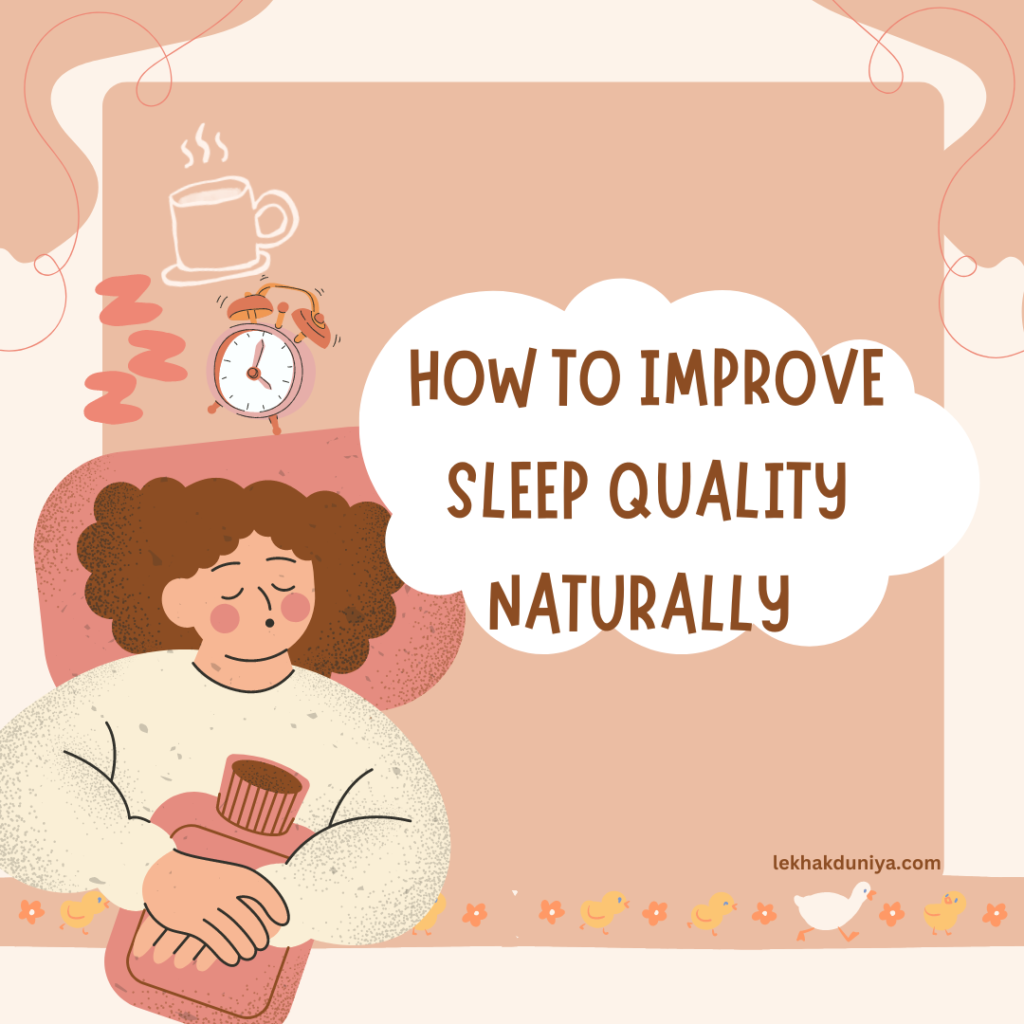In our busy modern lives, many people find it challenging to get the restful sleep they need. Yet, mastering the art of natural sleep improvement can transform your nights. Imagine waking up rejuvenated and energized every morning. This guide will reveal how to improve sleep quality naturally using simple yet effective strategies.
Nearly 45% of Americans report that poor sleep negatively impacts their daily life, according to the National Sleep Foundation. The CDC links insufficient sleep to a higher risk of chronic health issues like obesity, diabetes, and cardiovascular disease. Discovering natural methods to enhance your sleep quality can lead to better health and overall well-being.
This article provides practical tips on how to improve sleep quality naturally. We’ll delve into sleep cycles, circadian rhythms, lifestyle adjustments, and more, equipping you with the knowledge to achieve restful sleep.
Table of Contents
1. Understanding Sleep Cycles and Their Impact
Explanation of Sleep Stages:
To understand how to improve sleep quality naturally, it’s crucial to know your sleep stages. Sleep consists of various stages that cycle throughout the night.
- Stage 1 (NREM Sleep): This transition phase from wakefulness to sleep involves relaxation and slowing of brain waves.
- Stage 2 (NREM Sleep): Light sleep where heartbeat and breathing slow further, and brain activity diminishes. This stage is vital for memory and learning.
- Stage 3 (Deep Sleep/NREM): Known as slow-wave sleep, it’s essential for physical restoration. Deep sleep helps with muscle repair and immune function.
- REM Sleep: This stage, which typically begins around 90 minutes after you fall asleep, is characterized by vivid dreaming and plays a crucial role in enhancing cognitive functions, such as memory consolidation and emotional processing.
How Sleep Cycles Affect Quality:
Achieving uninterrupted sleep cycles is key to feeling refreshed. Disruptions during deep sleep or REM sleep can leave you feeling groggy. Understanding and maintaining these cycles helps in improving sleep quality naturally.
2. Aligning with Your Circadian Rhythm
What is the Circadian Rhythm?
Your circadian rhythm is your body’s internal clock, regulating sleep and wakefulness. It’s influenced by light exposure and helps maintain a regular sleep-wake cycle.
- The Role of Light: Morning sunlight exposure helps reset your circadian rhythm and boosts cortisol levels. Reducing evening light exposure supports melatonin production, signaling bedtime.
- The Suprachiasmatic Nucleus (SCN): This brain region coordinates your circadian rhythm with environmental light cues, essential for a regular sleep-wake pattern.
How to Align with Your Natural Rhythm:
How to improve sleep quality naturally, align your routine with your circadian rhythm.
- Morning Light Exposure: Spend 20-30 minutes in natural light after waking to help reset your internal clock.
- Consistent Wake-Up Time: Wake up at the same time every day to reinforce your sleep-wake cycle.
- Limit Evening Light Exposure: Reduce artificial light exposure before bed to promote melatonin production.
3. Dietary Choices that Enhance Sleep

Foods that Promote Sleep:
Diet plays a significant role in how to improve sleep quality naturally. Certain foods can help regulate sleep by supporting the production of sleep-promoting hormones.
- Tryptophan-Rich Foods: Tryptophan aids in producing serotonin and melatonin. Include turkey, chicken, eggs, and nuts in your diet.
- Magnesium-rich foods: Magnesium helps relax muscles and reduce stress. Opt for leafy greens, nuts, seeds, and whole grains.
- Melatonin-Rich Foods: Foods like cherries, tomatoes, and walnuts provide additional melatonin to regulate sleep-wake cycles.
Avoiding Sleep Disruptors:
Certain foods and beverages can negatively impact sleep quality.
- Caffeine: Avoid caffeine after 2 p.m. to prevent sleep disruption.
- Alcohol: Although it may induce sleep, alcohol disrupts sleep cycles and reduces REM sleep. Limit alcohol consumption and avoid drinking close to bedtime.
- Heavy and Spicy Meals: Steer clear of large, heavy, or spicy meals close to bedtime to avoid discomfort and digestive issues.
4. The Impact of Exercise on Sleep Quality

Benefits of Regular Exercise:
Exercise can significantly enhance sleep quality naturally when integrated into your daily routine.
- Improved Sleep Onset: Regular exercise helps you fall asleep faster by promoting physical fatigue and relaxation.
- Enhanced Sleep Depth: Exercise increases the duration of deep sleep, essential for physical restoration.
- Reduced Insomnia Symptoms: Consistent physical activity can alleviate insomnia symptoms by reducing stress and anxiety.
Timing Matters:
The timing of your workouts affects how to improve sleep quality naturally.
- Morning Exercise: Exercising in the morning aligns with your circadian rhythm, boosting alertness and energy throughout the day.
- Afternoon/Evening Exercise: If you exercise in the afternoon or evening, avoid vigorous workouts close to bedtime to prevent stimulation.
5. Creating a Sleep-Inducing Environment
Optimal Sleep Environment:
Your sleep environment plays a crucial role in natural sleep improvement.
- Keep It Cool: Maintain a room temperature between 60-67°F (15-19°C) to support the natural cooling process associated with sleep onset.
- Minimize Noise: Use earplugs, white noise machines, or fans to block out disruptive sounds.
- Block Out Light: Use blackout curtains or an eye mask to keep your room dark and support melatonin production.
- Comfortable Bedding: Invest in a quality mattress and pillows that offer proper support and comfort for your sleeping position.
Declutter Your Space:
A clutter-free bedroom promotes relaxation. Remove electronic devices and work-related items to create a restful environment.
6. The Power of a Bedtime Routine
Establishing a Consistent Routine:
Creating a bedtime routine is essential for how to improve sleep quality naturally. It cues your body that it’s time to relax and prepare for sleep.
- Wind-Down Activities: Engage in calming activities such as reading, listening to soothing music, or practicing relaxation exercises.

- Limit Screen Time: Avoid screens at least an hour before bed to prevent blue light from disrupting melatonin production.
- Bath or Shower: A warm bath or shower before bed can help relax your body and signal it’s time for sleep.
Stick to a Sleep Schedule:
Go to bed and wake up at the same time daily to reinforce your sleep-wake cycle and enhance sleep quality.
7. Managing Stress and Anxiety
The Sleep-Stress Connection:
Stress and anxiety can severely impact sleep quality. Managing stress is crucial for natural sleep improvement.
- Relaxation Techniques: Incorporate relaxation techniques into your routine to reduce stress and promote restful sleep.
- Mindfulness Meditation: Helps calm the mind and reduce anxiety, improving sleep quality.

- Deep Breathing: Use deep breathing techniques, like the 4-7-8 method, to relax your body and prepare for sleep.
- Progressive Muscle Relaxation: Tensing and relaxing muscle groups help release physical tension and promote relaxation.
Journaling:
Writing down your thoughts before bed can clear your mind and reduce anxiety, making it easier to fall asleep.
8. Limiting Stimulants and Sleep Disruptors
Impact of Caffeine and Nicotine:
Both caffeine and nicotine can disrupt your ability to fall asleep and maintain restful sleep throughout the night.
- Caffeine: Avoid caffeine in the afternoon and evening. It can remain in your system for hours, affecting your sleep.
- Nicotine: Nicotine is a stimulant that can disrupt sleep. Quitting smoking can improve sleep quality over time.
Alcohol and Sleep:
Limit alcohol consumption, especially close to bedtime, to avoid disrupting your sleep cycle and reducing REM sleep.
Screen Time and Blue Light:
Minimize screen exposure before bed to prevent blue light from interfering with melatonin production.
9. The Art of Napping
Benefits of Napping:
Napping can be beneficial if done correctly. It can enhance alertness and performance during the day.

- Short Naps (10-20 minutes): These provide a quick energy boost without affecting nighttime sleep.
- Longer Naps (30-60 minutes): Can be restorative but may cause grogginess. Nap earlier in the day to avoid affecting nighttime sleep.
- Timing Matters: Nap in the early afternoon to align with your body’s natural energy dip.
Avoiding Nap-Induced Sleep Disruption:
Limit naps to 20-30 minutes and avoid late afternoon naps to prevent interference with nighttime sleep.
Recognizing Sleep Signals:
Pay attention to your body’s natural sleep cues, such as yawning or drowsiness. These signals indicate that it’s time for sleep.
- Sleep Pressure: The buildup of sleep pressure throughout the day helps you feel tired in the evening. Respond to these signals by heading to bed when you feel sleepy.
Avoiding Forced Sleep:
If you’re not tired, avoid forcing sleep. Engage in relaxing activities until you feel naturally drowsy.
The Importance of Waking Naturally:
Waking up without an alarm indicates that you’ve completed your sleep cycles and are ready to start the day. Adjust your bedtime if you consistently wake up before your alarm.
How to improve sleep quality naturally involves understanding your sleep cycles, aligning with your circadian rhythm, making mindful dietary choices, and creating a sleep-friendly environment. By making small, consistent changes, you can enhance your sleep quality and overall health.
Start by implementing one or two of these strategies and monitor their impact on your sleep quality. Small adjustments can lead to significant improvements in how well you rest.
Try incorporating these natural methods into your daily routine. Keep a sleep journal to track your progress and share your findings with others. Better sleep is achievable—take the first step towards how to improve sleep quality naturally today!




Your enticle helped me a lot, is there any more related content? Thanks!
Your article helped me a lot, is there any more related content? Thanks!
Thanks for sharing. I read many of your blog posts, cool, your blog is very good.
Thanks for sharing. I read many of your blog posts, cool, your blog is very good.
I do enjoy the way you have presented this specific matter and it does supply me personally a lot of fodder for consideration. Nevertheless, from what I have experienced, I just hope as the actual opinions pack on that folks stay on issue and in no way embark on a tirade of the news of the day. Anyway, thank you for this exceptional point and while I do not concur with this in totality, I regard your standpoint.